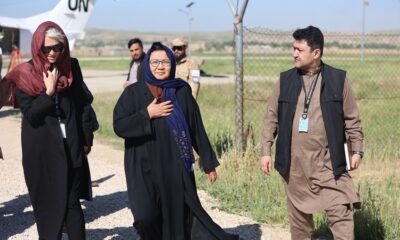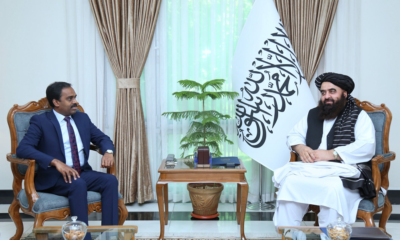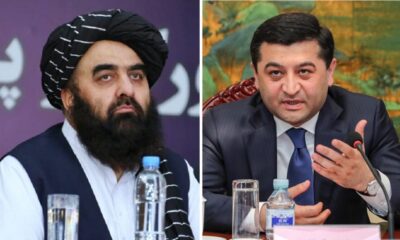Latest News
Red Cross set to end funding at 25 hospitals in Afghanistan
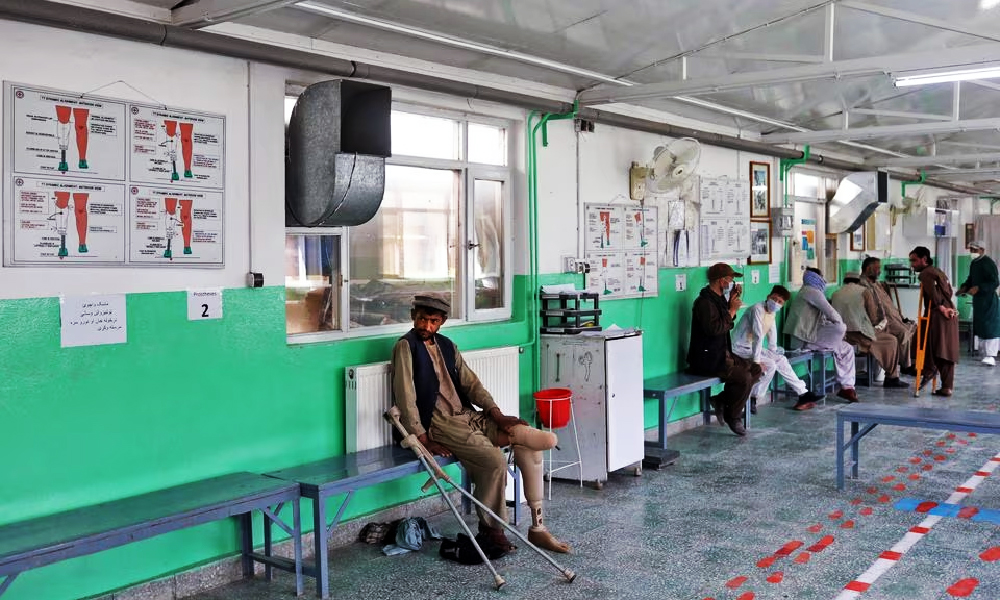
The International Committee of the Red Cross (ICRC) is likely to end the financial running of 25 Afghan hospitals by the end of August due to funding constraints, a spokesperson told Reuters, amid growing concerns over a plunge in aid to Afghanistan.
“Although we continue to engage with government ministries, donors, and organisations to find alternative sustainable support mechanisms for the hospital sector, the phase-out of the Hospital Program is expected to happen tentatively at the end of August,” Diogo Alcantara, ICRC’s spokesperson for Afghanistan, told Reuters on Thursday.
“The ICRC does not have the mandate nor the resources to maintain a fully functioning public health-care sector in the longer term,” Alcantara said.
In April, ICRC said its governing board approved 430 million Swiss francs ($475.30 million) in cost reductions over 2023 and early 2024 and a rolling back of operations in some locations as budgets for humanitarian aid were expected to decrease.
“The financial difficulties the ICRC is facing have sped up, in transparency with Islamic Emirate of Afghanistan (IEA) authorities, the expected return of the full responsibilities of the health services to the Ministry of Public Health,” Alcantara said, referring to the Taliban administration.
The program’s end comes amid growing concerns over cuts to Afghanistan’s humanitarian aid, two years after the IEA took over and most other forms of international assistance, which formed the backbone of the economy, were halted.
The Geneva-based organisation would continue its other Afghanistan health programs, including rehabilitation support for people with disabilities, Reuters reported.
A spokesman for the health ministry did not respond to request for comment.
It was not clear how much was needed to pay for the operations, which fund salaries and other costs at many of Afghanistan’s major hospitals serving millions of people, and if IEA authorities could cover that amount from the fiscal budget.
An Afghan finance ministry spokesman said this year’s budget had been finalised, but not publicly released.
The hospitals have been supported by ICRC since a few months after foreign forces left in August 2021.
Development funding was cut to Afghanistan as the IEA – which has not formally been recognised by any country – took over the country. The sudden financial shock imperilled critical public services including health and education.
The ICRC and other agencies including the U.N. stepped in to try to fill gaps.
“The (ICRC) took this decision back then to save the healthcare system from collapsing due to the financial crises that Afghanistan was experiencing and because many development agencies and other organisations left the country while the ICRC stayed,” Alcantara said.
The ICRC hospital program had originally covered 33 hospitals, eight of which have already been phased out, paying for the salaries of over 10,000 health workers and some medical supplies. The hospitals provided thousands of beds and served areas encompassing more than 25 million people – over half the population.
Neighbouring Pakistan is closely watching the development, a senior government official told Reuters. Pakistan, a major destination for healthcare for Afghans, routinely has thousands of medical visa applications lodged with its embassy, officials said.
“We are concerned about a further influx of medical patients,” said the Pakistani official, who declined to be identified to speak openly about sensitive diplomatic issues.
Pakistan’s foreign office did not reply to request for comment.
There is growing alarm over cuts to aid to Afghanistan, where the U.N. humanitarian plan for 2023 is only 25% funded, even after requested budget was downgraded from $4.6 billion to $3.2 billion.
Diplomats and aid officials say concerns over IEA restrictions on women alongside competing global humanitarian crises are causing donors to pull back on financial support. The Islamic Emirate has ordered most Afghan female aid staff not to work, though granted exemptions in health and education.
Almost three-quarters of Afghanistan’s population are now in need of humanitarian assistance, according to the aid agencies.
Latest News
UNAMA chief visits northern Afghanistan, meets local officials including women
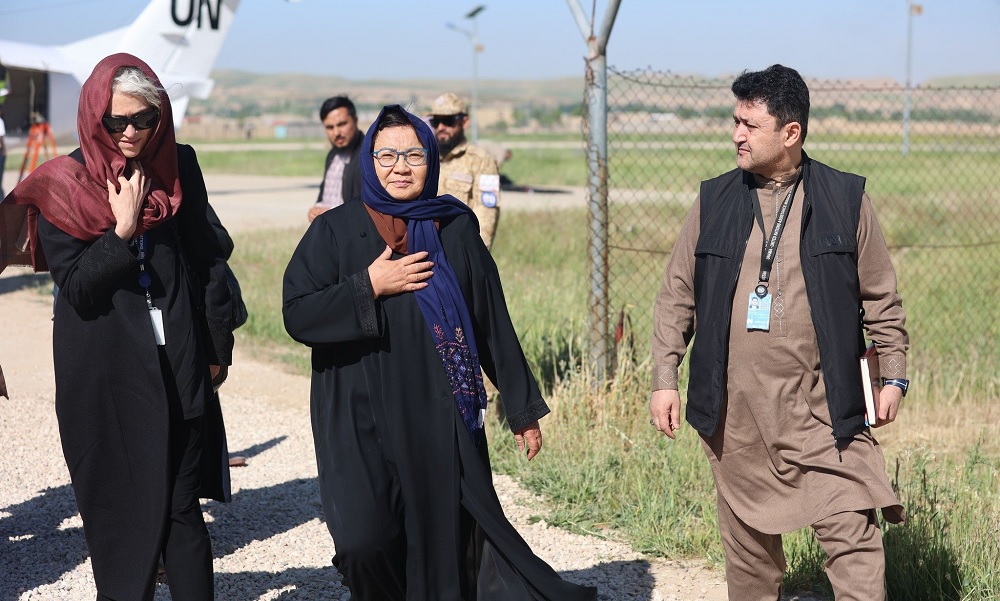
Roza Otunbayeva, Head of the United Nations Assistance Mission in Afghanistan (UNAMA), recently visited the city of Maimana in northern Afghanistan, where she met with local officials, entrepreneurs, and UN staff.
UNAMA wrote on its Facebook page on Sunday, that during the visit, entrepreneurs — including women — met with Otunbayeva, and requested support to facilitate access to new markets, particularly in Uzbekistan.
UNAMA further stated that among these entrepreneurs was a group of women who, with the support of the United Nations Development Programme (UNDP), had established a tailoring workshop.
They expressed their appreciation for the support received and spoke about the significant growth and development of their business.
UNAMA added that the organization remains committed to promoting economic opportunities and empowering Afghan communities, especially women.
Latest News
Senior Indian official meets with FM Muttaqi in Kabul
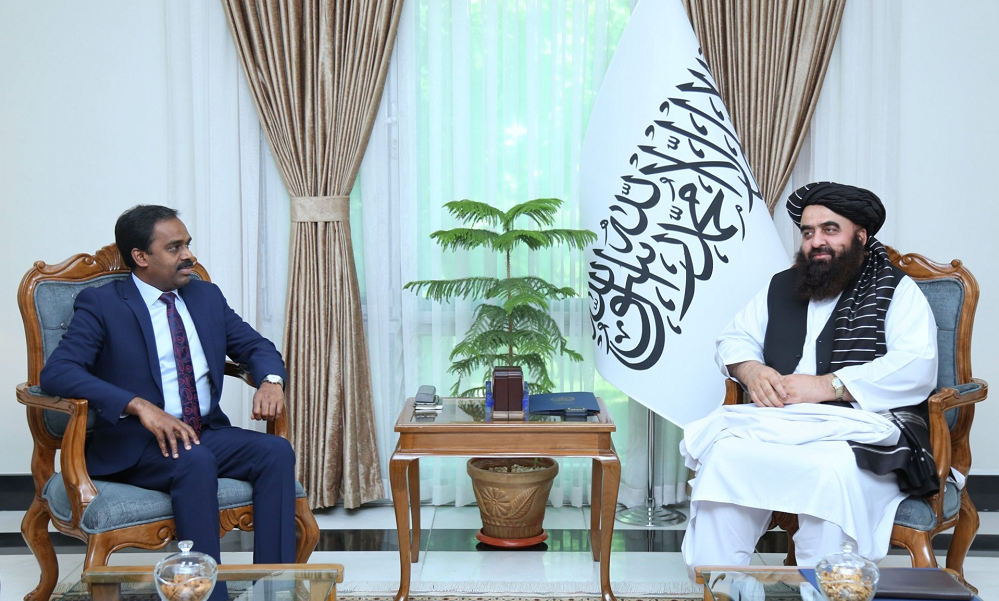
Anand Prakash, head of the Afghanistan, Iran and Pakistan Division of the Indian Ministry of External Affairs, met with Acting Foreign Minister Amir Khan Muttaqi in Kabul for talks on various issues.
According to a press release issued Sunday by the Afghan Foreign Ministry, bilateral political relations, trade, transit and recent political developments in the region were discussed in the meeting.
Muttaqi stressed the need for the expansion of diplomatic and economic relations between the two countries and explained that Afghanistan currently offers favorable opportunities for investment. He said Indian investors should take advantage of these opportunities.
He also said that facilities should be created for the movement of people between Afghanistan and India and the issuance of visas for medical purposes, students and businessmen should return to normal.
Meanwhile, Prakash said that relations with Afghanistan are important for India and he hopes that these relations will expand further in various fields.
He stressed that India will continue its cooperation with Afghanistan and wants to invest in some infrastructure projects and restart projects that were paused for some time.
The two sides also emphasized the expansion of relations, the exchange of delegations, visa facilitation and bilateral cooperation.
Latest News
Afghanistan ‘fully ready’ for Trans-Afghan railway project: Muttaqi
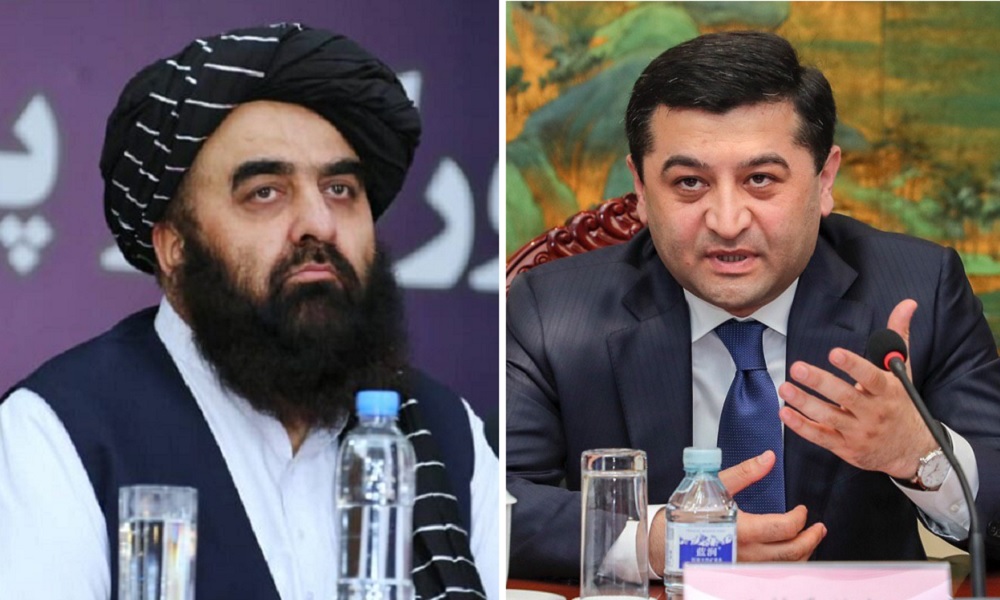
Acting Foreign Minister Amir Khan Muttaqi has said in a phone call with his Uzbek counterpart that Afghanistan is fully prepared for the implementation of the Trans-Afghan railway project.
During the call, the two sides discussed strengthening bilateral and multilateral relations, as well as expanding political, economic and transit cooperation, the Ministry of Foreign Affairs in Kabul said in a statement on Sunday.
Uzbek Foreign Minister Bakhtiyor Saidov noted that Afghanistan’s exports to Uzbekistan have tripled in the first four months of 2025 compared to last year. He vowed to create more facilities in the field of trade and transit between the two countries, especially in issuing visas to Afghan citizens.
Meanwhile, Amir Khan Muttaqi said that Afghanistan is fully prepared for the implementation of major economic projects such as the Trans-Afghan railway project and for the strengthening of political, trade and transit cooperation with Uzbekistan. He said that the existing opportunities should be utilized for the mutual benefit of the two countries.
The two sides also discussed the holding of a trilateral meeting between Afghanistan, Uzbekistan and Pakistan at the level of foreign ministers and agreed to coordinate through diplomatic channels to determine the exact date and place of the meeting.
The three neighboring countries signed an agreement in February 2021 to construct a 573-kilometer railway line through Afghanistan, connecting landlocked Central Asia to Pakistan seaports, with an estimated cost of $4.8 billion to enhance regional economic connectivity.
Pakistan’s Deputy Prime Minister and Foreign Minister Ishaq Dar held a telephone conversation with Uzbek foreign minister last Thursday to discuss the Trans-Afghan railway project.
Dar expressed hope that the three countries would soon sign a framework agreement on this important regional project.
-

 Sport5 days ago
Sport5 days agoSri Lanka A defeats Afghanistan A by 4 wickets in Abu Dhabi
-

 Business5 days ago
Business5 days agoAfghanistan’s growth prospects remain uncertain amid global uncertainty: World Bank report
-
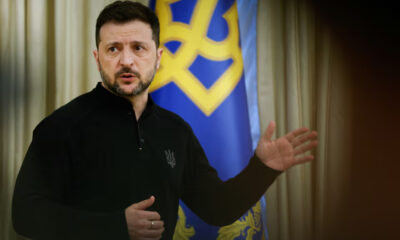
 World5 days ago
World5 days agoUkraine ready to hold talks with Russia once ceasefire in place, Zelenskiy says
-

 Latest News4 days ago
Latest News4 days agoAWCC activates new site in Nangarhar’s Kuz Kunar district
-

 Latest News4 days ago
Latest News4 days agoTarig Ali Bakheet and Japan’s Deputy Foreign Minister discuss Afghanistan’s situation
-

 Climate Change5 days ago
Climate Change5 days agoPowerful earthquake of 6.2 magnitude shakes Istanbul
-

 Business4 days ago
Business4 days agoPakistan’s deputy PM discusses Trans-Afghan Railway Line project with Uzbek FM
-

 Latest News5 days ago
Latest News5 days agoSpecial meeting will be held to launch Afghanistan–Russia joint commission, says Kabulov


